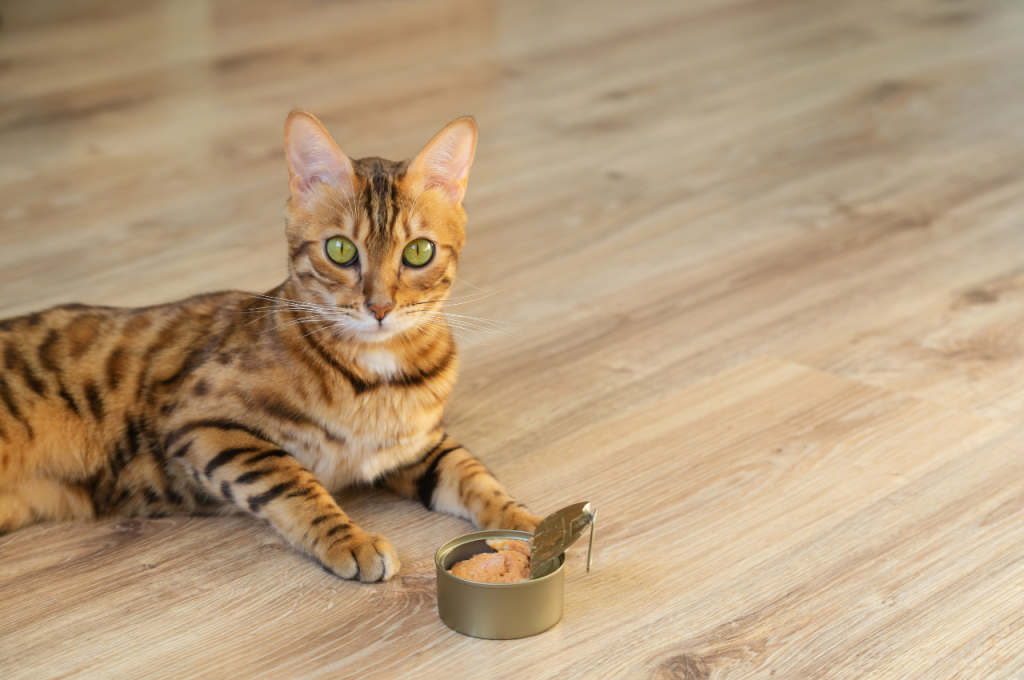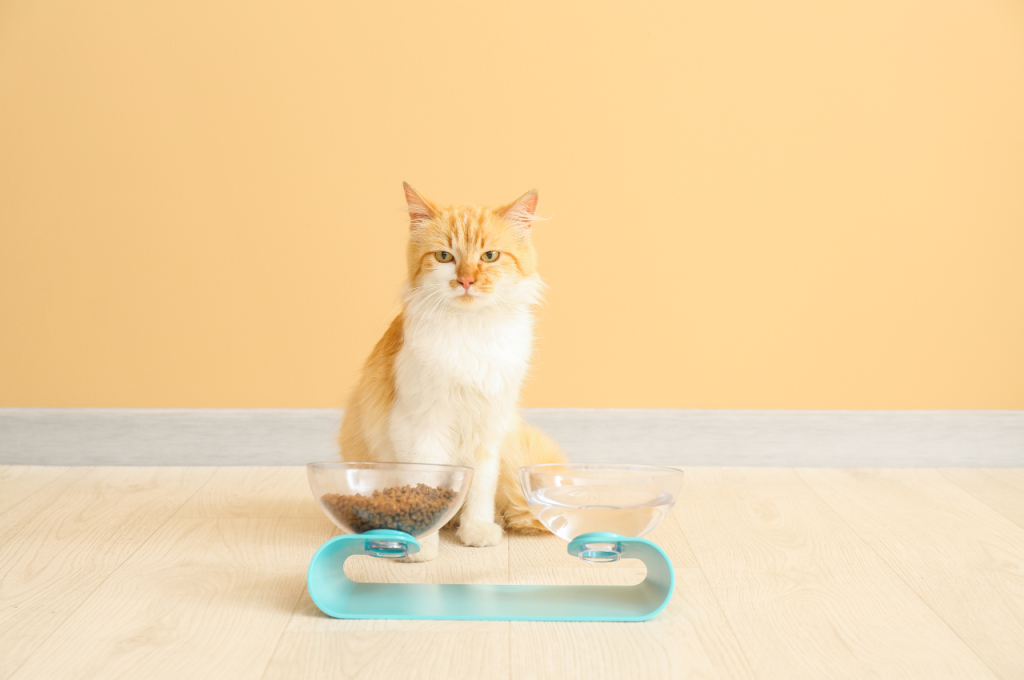To help your cat lose weight, feed her a balanced diet with controlled portions and consult with a veterinarian for advice accordingly. Introducing a weight loss diet for your cat is essential to ensure her overall health and well-being.
Just like humans, overweight cats are at risk of numerous health problems, including diabetes, heart disease, and joint issues. However, it’s important to approach weight loss in cats with caution, as immediate and drastic changes to their diet can have negative effects on their health.
Instead, focus on gradually reducing their calorie intake through controlled portions and balanced meals. Combine this with regular exercise and playtime to increase their activity levels. Consulting with a veterinarian is essential as they can provide tailored advice, assist in creating a suitable meal plan, and monitor your cat’s progress to ensure a healthy and effective weight loss journey.
1. Importance of Healthy Weight for Cats
Maintaining a healthy weight is crucial for cats to avoid various health issues. To help your cat lose weight, consider feeding her a balanced, low-calorie diet with high-protein content. Incorporating regular exercise and controlling portion sizes can also assist in achieving and maintaining a healthy weight for your feline companion.

Maintaining a healthy weight is vital for cats as it directly impacts their overall well-being. An excess of body weight can lead to various health issues, affecting their quality of life. Let’s dive into the risks of obesity in cats and the benefits of ensuring they maintain a healthy weight.
1.1 Risks of Obesity in Cats
Obesity in cats can have severe consequences, both in the short and long term. Here are some risks associated with feline obesity:
- Increased risk of diabetes: Just like humans, overweight cats are more susceptible to developing diabetes. The excess body fat affects insulin sensitivity, disrupting their glucose metabolism.
- Joint problems: Extra weight puts excessive stress on your feline friend’s joints, leading to mobility issues and joint diseases like arthritis. This can significantly impact their quality of life and increase their pain levels.
- Heart and respiratory issues: Obesity can lead to cardiac and respiratory problems in cats. The heart has to work extra hard to pump blood and oxygen through the fat-laden tissues, leading to strain on the cardiovascular system.
- Lowered immune function: Overweight cats often have compromised immune systems, making them more vulnerable to infections and diseases. Their ability to fight off illnesses may be significantly reduced, affecting their overall health.
1.2 Benefits of Maintaining A Healthy Weight
Ensuring your cat maintains a healthy weight comes with a multitude of benefits, including:
- Enhanced mobility: Cats at a healthy weight can move around easily and engage in physical activities without discomfort. Maintaining an ideal weight supports their joints, muscles, and overall agility, enabling a more active and fulfilling life.
- Improved lifespan: Studies have shown that cats in good physical shape tend to live longer than their overweight counterparts. By keeping your cat at a healthy weight, you give them a better chance of enjoying a longer, happier life by minimizing the risk of obesity-related health issues.
- Reduced risk of medical conditions: Maintaining a healthy weight significantly lowers the chances of a cat developing common weight-related health conditions such as diabetes, heart disease, respiratory problems, and gastrointestinal disorders.
- Increased energy levels: A cat at a healthy weight is more likely to have higher energy levels. They will be playful and enthusiastic, engaging in activities that promote their mental and physical well-being.
- Optimal coat condition: Excess weight can make it difficult for cats to groom themselves properly. A healthy weight ensures they can reach and clean every part of their body, resulting in a soft, shiny coat that reflects their overall well-being.
By understanding the risks of obesity in cats and the benefits of maintaining a healthy weight, you are equipped to make informed decisions about your feline friend’s diet. Providing them with optimal nutrition and engaging in regular exercise will support their weight management journey. Remember, a healthy weight is an essential part of your cat’s happiness and longevity.
2. Understanding Cat Nutrition Needs
When it comes to helping your cat lose weight, understanding their nutrition needs is crucial. As obligate carnivores, cats require a diet that includes high-quality animal protein and essential nutrients. Providing the right balance of nutrients can support weight management and overall health. Here, we’ll delve into the key aspects of cat nutrition for weight loss.
2.1 Essential Nutrients for Weight Management
Cat nutrition for weight management involves ensuring that your feline friend receives the right nutrients in appropriate quantities. Some essential nutrients that play a vital role in the weight loss journey are:
- Protein: As obligate carnivores, cats need a diet rich in animal protein. It helps maintain muscle mass while promoting a feeling of fullness.
- Fiber: Including a moderate amount of fiber in your cat’s diet can aid in appetite control and digestion.
- Omega-3 Fatty Acids: These healthy fats contribute to a cat’s overall well-being and can reduce inflammation, which may be beneficial for weight loss.
- Water: Keeping your cat hydrated is crucial, as it supports digestion, metabolism, and overall health.
While these are important nutrients, it’s essential to consult your veterinarian to determine the precise dietary requirements for your cat’s weight management.
2.2 Ideal Portion Control
Proper portion control is vital when it comes to helping your cat shed those extra pounds. Here are a few tips to ensure ideal portion control:

- Weigh the Food: Invest in a digital kitchen scale to accurately measure your cat’s food portions. This helps prevent overfeeding.
- Follow Feeding Guidelines: Check the packaging of your cat’s food for recommended portion sizes based on their weight and activity level.
- Divide Meals: Split your cat’s daily food intake into several small meals throughout the day. This can help prevent overeating and keep their metabolism active.
- Avoid Free-Feeding: Leaving food out all day may lead to excessive consumption. Instead, establish specific meal times to control portion sizes.
By practicing these portion control tips, you can better manage your cat’s calorie intake and promote successful weight loss.
3. Recommended Foods for Weight Loss
When it comes to helping your cat lose weight, choosing the right foods is crucial. Here are some recommended foods to aid in your feline friend’s weight loss journey.
3.1 High-protein Diet Options
High-protein diets are ideal for weight loss in cats. Opt for quality protein sources such as chicken, turkey, and fish. These lean meats provide essential nutrients while helping your cat feel full with fewer calories.
3.2 Low-calorie Treats and Snacks
When it comes to treating your cat during weight loss, low-calorie options are key. Consider treats that are labeled specifically for weight management. Look for treats with high protein and low carbohydrate content to help your cat maintain muscle mass while shedding excess fat.
4. Effective Feeding Strategies
When it comes to helping your cat lose weight, effective feeding strategies play a crucial role in achieving success. By implementing the right meal timing and frequency, as well as adopting specific feeding techniques, you can support your cat in reaching a healthier weight.
4.1 Meal Timing and Frequency
- Meal Timing: Cats should be fed two to three small meals a day to control portion sizes and prevent excessive eating.
- Meal Frequency: Spread out feedings at consistent times to establish a routine that helps control your cat’s hunger.
4.2 Feeding Techniques for Weight Loss
- Portion Control: Measure your cat’s food to avoid overfeeding and help her maintain a healthy weight.
- Slow Feeding: Utilize puzzle feeders or feeding toys to slow down your cat’s eating pace and encourage portion control.
- High-Protein Diet: Choose high-protein, low-carb cat food to support weight loss and muscle retention.
5. Additional Tips for Successful Weight Management
To help your cat lose weight, incorporate low-calorie and high-protein foods into her diet. Additionally, portion control and regular exercise are crucial for successful weight management. To help your cat lose weight effectively, consider incorporating the following additional tips into her weight management plan:
5.1 Incorporating Exercise into Your Cat’s Routine
Regular physical activity is essential for your cat’s weight loss journey. Try interactive toys, laser pointers, or designated playtime to keep your feline friend moving.
5.2 Monitoring and Adjusting for Progress
Track your cat’s progress by monitoring her weight regularly. Adjust her meal portions as needed based on her response to the weight loss plan. Remember, successful weight management for your cat involves a combination of a balanced diet, appropriate feeding portions, and regular exercise. By following these additional tips, you can support your cat in achieving a healthy weight.

Conclusion
Helping your cat achieve a healthy weight requires a balanced approach to her diet. Incorporating lean proteins, high fiber, and portion control are key. Additionally, regular exercise and monitoring her progress are crucial. Remember to consult with a veterinarian for personalized guidance and support.
Let’s help our kitties live their best and healthiest lives!
